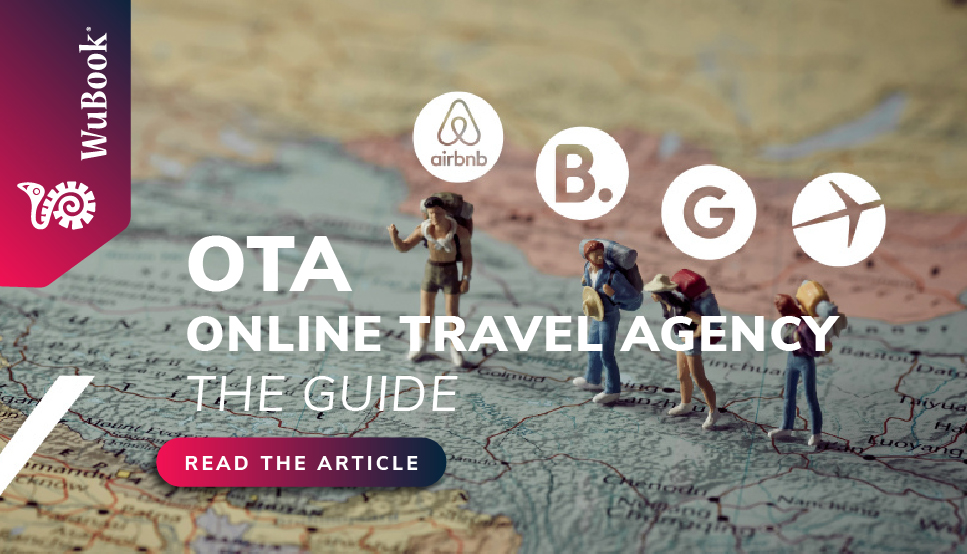Dear WuBookers, your tourism marketing glossary cannot miss the definition of OTA. Anyone who manages a hotel property must be clear about what they are, how they work, and what advantages and disadvantages they bring. Fundamental information in deciding whether to use them and which ones to use.
What are OTAs
OTA stands for “Online Travel Agencies”: travel agencies that operate online, providing an intermediary service between guests and properties for a commission.
OTAs are a key part of tourism web marketing: those who want to plan a trip on their own rarely search for accommodation on generic search engines, but rely on specialized sites. Once here, tourists can compare different types of accommodation for the place and dates of their interest and finalize their booking, without leaving the portal.
How OTAs work
We have said that OTAs offer guests a facilitating service in finding and booking accommodations. They do this by giving travelers access to everything they might want for their next trip. They often offer packages that include airline and hotel tickets or special offers, such as “flash sales,” to increase bookings to partner airlines and hotels.
Through their intermediation, OTAs ensure the reliability of the facilities on the portal. This is not just a matter of maintaining the reputation of the portal itself, but an operational matter that ensures travelers that the booking contract, cancellation rules and the delivery of the agreed service are respected.
Along these lines, there are also agencies that do not provide hotels and B&Bs with guests’ payment card details to ensure that payments are charged on schedule and that any penalties are charged only if they are actually due. Finally, some OTAs do not provide facilities with direct contact details of guests, thus forcing both parties to broker through their site. All features aimed at protecting and reassuring travelers, incentivizing them to use these tools for their reservations.

Online travel agencies earn by taking a commission on bookings ranging from 5% to 25%. In most cases, in fact, listing the property within the portal is free, but there is a payment from the hotelier for each reservation received through the OTA. This cost falls entirely on the hotelier or property manager, although there is no shortage of options where part of the commission can be attributed to the guest.
Another (optional) expense item is related to advertising: very often hotels have to invest extra budget to be advantageously positioned in travelers’ search results. This model is generally based on pay-per-click logic and is also the same model used by metasearch.
Differences between OTAs and Metasearch
Unlike OTAs, which are true sales channels, metasearch are aggregators of results. In Italian they are also called meta-search engines, a definition that helps to understand even better their mechanism and how they differ from OTAs.
In fact, metasearch queries multiple portals (including the hotel’s own site) and offers the user a list of results containing availability and rates of sale for a given property, along with a link for booking on the various portals. This means that the hotel may be competing with itself if it applies separate sales rates for each channel.
As anticipated, moreover, metasearchs are paid according to a typical online advertising model, (i.e., per clicks or visits to the target link and not on commission), since they do not deal with the booking process.
Advantages and disadvantages of OTAs for customers and hoteliers
It should be clear by now that online travel agencies bring significant benefits to both the traveler and the accommodation owners. The former have the opportunity to sift through many solutions for their vacation and take advantage of offers and protections; the latter gain great visibility and increase the likelihood of sales. Precisely by virtue of their convenience, in fact, OTAs have millions of monthly visitors: numbers that the establishment can hardly obtain on its own.
In addition to the potential gains from indirect sales, visibility on the right OTAs can also have a positive impact on direct bookings, (i.e., those that take place on the facility’s website). This happens because many users, once they find the optimal solution through the online agency, leave the portal and search online for the facility’s website (the so-called “billboard effect“). Here they can get more pictures and information, favorable economic conditions, more flexible policies, and greater availability of accommodations. For the hotelier, this phenomenon translates into lower sales costs, since they do not have to pay the OTAs’ brokerage fee.
However, there are also disadvantages, both for the traveler and the host. Not all OTAs are equally reliable, and there may be costs or fees added at the time of booking that did not appear at the time of the offer. Or, there can be problems with customer service. In fact, it may happen that you need support and find yourself paying separately for this assistance.On the property side, however, it is important to plan one’s distribution strategy well to avoid triggering a mechanism of dependency from OTAs. In addition to the extra costs to consider, this condition exposes the hotelier to the risk of suffering any changes to the portal and its performance. In other words, if the platform were to lose quality or traffic tomorrow, the property’s business would be significantly affected.
Another aspect to consider relates to control over brand image since not all of the information included in the hotel card is managed by the hotelier. Some in fact are imposed directly by the OTA according to internal promotion standards and logic, thus creating some potential contradiction to the institutional image.
The main OTAs
Almost every OTA has its own target market or geographic area, both in terms of location of facilities and guest catchment area. However, there are OTAs that are so widespread that they now have a global presence.
Some of the most important are:
- Booking.com: is one of the largest OTAs in the world, with millions of active users internationally. Commissions are around 15 percent but vary depending on the type of property and location. Tools offered to hoteliers include useful analysis and reports to optimize pricing strategies and the ability to participate in marketing programs to increase the visibility of the property;
- Airbnb: an online platform founded in 2008, it allows people to rent private accommodations, such as houses, apartments, rooms, and shared spaces. It is also popular with guests and hosts because of the degree of control and flexibility offered to both. Indeed, hosts can decide whether or not to admit guests and impose their own house rules. Airbnb also provides 24/7 support service and offers insurance coverage for damages and liability;
- Expedia: among the longest-running and most established OTAs on the global scene, Expedia is part of the Expedia Group, which also includes Hotels.com, Vrbo, Travelocity, Orbitz and many others. This allows it to increase the visibility of the property exponentially, maximizing bookings;
- HRS: Established in Germany in 1972, HRS now attracts a global audience. While HRS has evolved its offerings to serve business and leisure tourists, it is particularly strong in the business travel sector: it promises visibility and contacts with large companies and mutually beneficial bidding and payment policies;
- Agoda: an alternative to Airbnb and beyond, this OTA is very popular in Asia and gives hosts access to a large audience of travelers from that part of the world. Agoda also provides two different systems depending on the type of property: Agoda Homes, for housing hosts, and Hotels, for hotel properties. The fee varies depending on the location and type of accommodation.

In addition to these, there are many “vertical” portals, (i.e., specializing only in facilities of a certain type), or OTAs that are active only in specific territories, even very circumscribed ones, or that are visible only to those who connect from certain areas or countries.
Choosing the right OTAs therefore depends on many factors, such as: insured benefits, commission costs, ease of use and integration with any other online tools, membership policies, and sales performance over time. In any case, for the investment – even “only” of time – to be rewarding, it is necessary to have dedicated management software.
Channel Managers and OTAs
If you decide to use the services of online travel agencies, perhaps combined with those of meta-search, you should also make use of a channel manager: a technological system with which you can easily and simultaneously manage the supply and sale of an accommodation facility’s rooms on multiple booking platforms.
Zak’s Channel Manager, WuBook’s PMS for hotels and accommodations, is in fact able to update in real time (and automatically) the availability of rooms or apartments on all sales platforms to which it is connected. This reduces any discrepancies between booking calendars (avoiding the risk of overbooking), and saves time and resources. In this regard, recent features developed within WuBook’s PMS include one related to messaging management for Airbnb that allows the hotelier to respond to messages received from the guest via the OTA or to initiate a conversation following a reservation received. This is an ideal solution for optimizing timing and steps, since everything is done within the WuBook dashboard, without the need to connect to the OTA’s extranet.
In the current landscape, the existence and benefits of OTAs cannot be ignored, but for everything to work properly, it is necessary to approach these channels with the right tools.
